Lillie Ammann's Blog, page 36
November 15, 2018
Writing Love and Life
 Image: © Depositphotos.com/ivelin
Image: © Depositphotos.com/ivelinNovember 15 is I Love to Write Day and November is National Life Writing Month.
How do you celebrate I Love to Write Day? By writing, of course. It doesn’t matter what you write. It doesn’t matter how much you write. Writing today is intended to be fun—to do something you love. If you’ve wanted to write but delayed getting started or if you used to write and have let it fall by the wayside, today can give you a jump start on getting started or starting again.
Write a letter, a blog post, or an article. Write a prayer or meditation, the beginning of a book, or a poem.
 Image: © Depositphotos.com/gustavofrazao
Image: © Depositphotos.com/gustavofrazaoOr, since this is National Life Writing Month, you might start your memoir or family history. I have a free ebook that can help with that: Preserving Memories: How to Write a Family History. Although the title says “family history,” the information is just as helpful for writing memoirs.
I believe everyone should leave a legacy of his or her life. My mother hand wrote what she called her “little stories,” just random recollections from her life. They were in no particular order, written as they occurred to her over a period of several years. I typed them up, cleaning up grammatical errors, but maintaining her voice, and added photos. These “little stories” were compiled in loose-leaf binders for family members, and new stories were added each Christmas.
My mother-in-law dictated her life story from beginning to as far as she wanted to tell into a tape recorder. I transcribed her dictated words and created notebooks for family members as I did for my mother.
My husband didn’t write his own story, so I did it for him. After he died, I compiled anecdotes from I collected from family members and friends along with favorite stories that he often told about his life. I added some stories of my own, mostly from previous blog posts, and published Jack Stories: Favorite Memories of Jack Jordan Ammann Jr. It is for sale online, but I accomplished my purpose when I held a memorial eightieth birthday celebration for him and gave away signed copies of the book to friends and family. Jack was such a colorful character than even people who didn’t know him enjoy his stories, but I wrote it for his loved ones.
I’ve told my own story on this blog as well as in books. My first novel, Stroke of Luck, was fiction, but the main character experienced a stroke and recovery based on my own experience. The stories in my devotional book, Finding God in the Everyday, are stories of my life and faith.
I have clients who have written family history as fiction and one who created a cookbook of recipes from family members with short snippets about the person or the memories associated with the food.
You can write your story for loved ones only or publish a book to share your story with the world. You can tell your story in a memoir, family history, fact-based novel, cookbook, or collection of memories. Your story can be short or long, simple or elaborate, happy or sad (most likely, some of each). But it’s your story, and I encourage you to share it.
November 11, 2018
November 6, 2018
November Is …
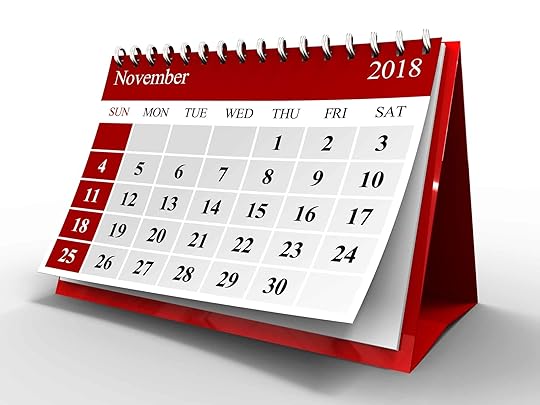
November is recognized for so many causes that I am recognizing several of them in this one post. I have devoted full posts to individual “months” in the past.
National Alzheimer’s Disease Awareness Month
This is a cause close to my heart as I have seen this disease first hand in my grandfather, my father, and my husband. When my grandfather’s mind deteriorated to the point that he—who had always been so gentle and loving—became violent, my father and his siblings had to commit him to the state mental institution. In those days, there were no care facilities and little knowledge of the disease—in fact, he didn’t have a diagnosis of Alzheimer’s, but a generation later our family saw my father exhibit the same symptoms when he was diagnosed with the disease.
I was not quite twelve years old at the time (more than sixty years ago), but I still remember all the adults in the family forcing Grandpa into the car for the hundred-mile drive to the hospital. Children under the age of twelve were not allowed inside the hospital, and I recall my siblings and I waiting in the car in the parking lot while my parents visited Grandpa. He died before my twelfth birthday, so I never saw him again after the terrifying scene of Grandpa fighting his children to avoid being locked up.
Today there is much more information about the disease and a variety of care facilities and services. If you haven’t had any experience with Alzheimer’s and other dementias, this is a good to educate yourself. I highly recommend my sister’s book, Help! What Do I Do Now? Caring for Your Loved One with Alzheimer’s.
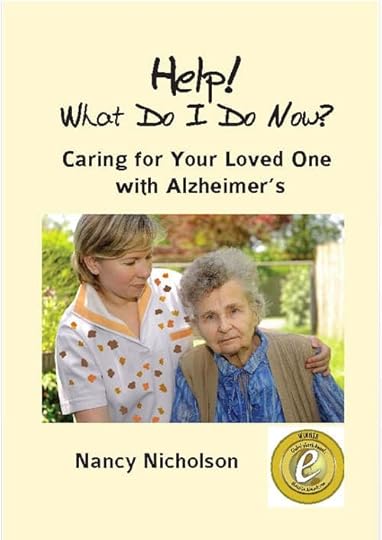
National Family Caregivers Month
I was one of several family caregivers for my father as long as he was able to stay at home. He reached the point that he was completely unable to do anything, even communicate, and required full-time care in a facility. But before that, Mama kept him at home and my sisters, my nephews, and paid caregivers took care of him.
Nearly two decades later, I became the sole caregiver for my husband. For the last couple of years of his life, I was with him constantly, and he was very much dependent on me. I had part-time help, but I was responsible for his care. It was challenging, but such a blessing. I’m thankful that he knew me to the end and that I could keep it at home and care for him with only part-time help.
American Diabetes Month
This is another disease that I’m intimately familiar with. For several generations, every female in my mother’s family has developed diabetes later in life. My husband was also diabetic and insulin-dependent. Part of my caregiving included making sure he gave himself his insulin injections. Until he was terminal and receiving palliative care only, he could give himself his shots if I prepared the injection and handed it to him when it was time.
I also have diabetes, but fortunately it is controlled with oral medication. After seeing my husband, my mother, and my grandmother give themselves injections every day for years, I hope I never have to do that.
Military Family Appreciation Month
My father served in the military before I was born, and my husband served before we met. So I have no experience being part of a military family. But I have great appreciation for the families who sacrifice and support our military members. We don’t always realize how difficult it is for the families of our soldiers, sailors, airmen, and marines.
Children make friends and become part of a school and community, then they’re uprooted to move because Daddy (or Mama) has a change of duty station. Children and spouses alike miss and worry about their deployed loved ones. Spouses have to make all the decisions and deal with all the problems alone while the military members are serving our country. They may not face enemies with guns and bullets, but military families face hardships.
This month is a good time to thank them for their support of their loved ones who serve.
National Adoption Month
This is another cause close to my heart. My husband and I adopted our son William at age eleven. Adopting an older child presents special challenges because the child will have been through a variety of experiences in the earlier years. Poverty, hunger, abuse, neglect, rejection, and constant instability are common. It’s much easier to start with an infant, but older kids need families who love them and who will help them overcome their bad and sad experiences.
Jack and I had been married ten years when we adopted William. When the adoption was final, he was issued a new birth certificate. with his parents listed as Jack and Lillian Ammann. His place and date of birth were the original ones. So William was born to Jack and me three months before we met (eleven months before we were married) in a place neither of us had ever been.
I’m so thankful for our son and encourage anyone wanting children to consider adoption.
Celebrate November
Of course, a highlight of November is Thanksgiving. I’m thankful for so many things, including:
Increased awareness, treatment, and care options for Alzheimer’sFamily members who choose to care for those they love, whatever kind of care the loved ones needImprovements in the treatment and awareness of diabetesMilitary families who sacrifice and support the military members who sacrifice for our countryLoving families who adopt children without a forever family, especially those who adopt older children and children with special needs
October 20, 2018
Three Social Media Tips for Aspiring Authors: Guest Post from Avery Phillips

It’s not easy being a writer – from writer’s block to wondering where your next paycheck is coming from, the difficulties of being a writer are aplenty. One area in particular that lot of aspiring authors struggle with is the promotional side to being a writer. Today, with the overwhelming amount of information out there, getting your voice heard above all the noise takes real work. Social media is an integral part of any content marketing strategy and is one of the best ways to distribute your marketing message. If this sounds confusing to you, and you’re struggling to get your book out there, read on for some social media tips that will get the ball rolling.
It’s Not All
About You
Social media shouldn’t be used as a way to simply hype you/your newbook up and get sales. In an article on Bookbub, literary agent Eric Smith states “no one wants to hangout with that person at a party who is only talking about themselves. You know that person. They make every office party about them. We’ve heard the story of your vacation like a dozen times, Chet. Let someone else talk.” This should be your social media strategy in a nutshell.
Eighty percent of your social media efforts should involve
sharing blog posts, advice, recommendations, book reviews and boosting up
fellow authors. Only 20 percent of your efforts should be sales related: info
about your new book, where it’s available and such. If your social media feed
is all about you, all the time, it won’t engage an audience or build a
following — instead, people are likely to get bored with constantly hearing
about only you.
Don’t Forget the
Visuals
Online, you are competing with a lot of visual information. To be noticed, you need to ensure that your images and graphics capture people’s attention. Consider author Rupi Kaur, who built up a massive following on Instagram. Her short, heartfelt poems, paired with simple black-lined graphics on a white background, were a major hit among the Instagram community. She created something visually appealing while giving readers insight into her typeof writing. Eventually, Instagram acted as the perfect platform for the promotion of not just her first but also her second book.
View this post on Instagram
October 10, 2018
National Disability Employment Awareness Month
 Handicapped woman attending a meeting in office
Handicapped woman attending a meeting in officeOctober is National Disability Employment Month. That’s a cause close to my heart for two reasons:
When I owned an interior landscape company, I employed individuals with disabilities and found them to be conscientious, hard workers. In a previous post, I wrote about a worker who was profoundly deaf. When I had a stroke at the hands of a chiropractor at the age of 45, it wasn’t as easy for individuals with disabilities to find employment. Had I not already owned my own business, I would likely have had a hard time finding a job.
I encourage employers to consider hiring qualified workers who happen to have disabilities. Although you might have to make a few special accommodations, I believe you will find the minor inconveniences worth it.
If you are a worker who has a disability, remember that your abilities are more important than your disabilities. Focus on what you do well. As the song says, “Accentuate the positive; eliminate the negative.”
If you’re neither an employee or a worker with disabilities, I hope you will take advantage of National Disability Employment Awareness Month to learn more.
October 5, 2018
Domestic Violence Awareness Month

October is Domestic Violence Awareness Month (DVAM). If you’re fortunate enough to have no firsthand knowledge of domestic violence, this is a good time to learn about it. You may be surprised to find out that someone you know and respect is an abuser or a victim.
Many years ago, I knew nothing about domestic violence. I was teaching a third grade Sunday School class and was surprised at how one young child reacted when he accidentally knocked over a cup of coffee and spilled hot coffee on my dress. I described the incident in detail in an earlier post. Much later, I realized the child’s behavior—backing away from me, holding up his arms in front of face, and apologizing over and over again—were signs that he was a victim of abuse. However, his parents—a military officer and a stay-at-home mom—were active in our church and respected in our community. I would never have suspected either of them of domestic violence. But someone close to the child had obviously made him fearful, and I didn’t recognize the signs.
Many, many years later, I started writing Dream or Destiny, a romantic mystery. For the first time, the characters guided me in writing the story. That’s not as crazy as it sounds; many writers will tell you something similar. The hero let me know he and his sister had been victims of child abuse. I did a lot of research, described in a post for Domestic Violence Awareness Month several years ago. I’m pleased with the favorable reviews and reader responses to the story, but I’m proudest that several reviewers and readers thought I was writing from personal experience of abuse. Of course, I hope the romance and mystery elements of the story are as compelling and believable as the abused characters.
To learn some of what I discovered in my research, type “domestic violence” in the search bar and read my previous posts on the subject.
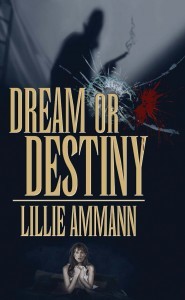
I have some author copies of Dream or Destiny, and I will give an autographed copy of the book to each person who makes a donation to any domestic violence organization—shelter, hotline, or provider of resources or education. The book is free; all I ask is $4.00 for shipping and handling. Email me at lillie@lillieammann.com with a copy of the receipt for your donation along with your mailing address and how you want the book inscribed. Send the shipping fee to that same email address through PayPal.
Thank you for donating to raise awareness or to help abuse victims. I hope you enjoy Dream or Destiny.
September 28, 2018
The Entrepreneurship of Writing: Guest Post from Avery Phillips

As with any other group of creative
individuals who attempt to live off their art, writers experience many
obstacles and challenges in writing for a living. Writing for money is often an
entrepreneurial feat: those who attempt to sell their writing must know the
business and know how to sell themselves along with their writing to make
enough money to sustain themselves. These are a few concepts writers must keep
in mind to be successful in making a living.
Entrepreneurship Concepts
Entrepreneurs take their life into their own hands, which can be a scary concept, and is a reason that many people who sell their art and writing often have second jobs. However, in 2015, entrepreneurs made up 10 percent of the U.S. workforce, which means that 15 million people were self-employed and making money from personal ventures. As an entrepreneur, you are constantly selling yourself and your work to clients and firms, which means your verbal and written communication skills must be highly effective.
When running your own business or selling any
kind of personal art, it’s important to market yourself in the way you wish to
be perceived. Your name is your brand and people will associate the way you run
your personal life with what your art stands for. Therefore, depending on who
your intended audience is and what kind of writing you’re doing, it’s important
that your online presence is in line with the beliefs of your audience and that
you steer away from controversial topics that could polarize members of your
writing community.
Marketing and self-promoting is your key to surviving as an artist, which means you should promote yourself and your brand through social media and content marketing, as these are some of the more accessible ways to gain recognition. Anything you post personally is tied to your craft and to you brand, which means you should think twice before posting content that could reflect poorly on your brand. Be intentional, highlight your name, promote your niche and practice good business tips for your freelance writing.
Writing Organization
To move forward with a writing career, it’s
important to be diligent in managing yourself and your time to finish writing
projects. One of the challenging parts of being a freelance writer, or writing
a novel, is dedicating enough time each day toward your goals and keeping an
organized schedule. When you’re your own boss, it’s easy to let things come
between you and your goals. Keep track of your progress so you can celebrate
your accomplishments and see how far you’ve come during times that you slow
down or are not getting as far as you’d hoped.
Maintaining an organized workspace can help ensure that your writing process goes as smoothly as possible. This is especially important for online files, as some writers have the tendency to save files wherever is easiest with the intention of organizing it later. However, if you’re writing each day, this can become messy very quickly, and can be the cause of losing important files and even entire segments of work that you’ve completed. If you’re someone who keeps paper files, the best way to store your papers and documents may vary based on your work style, however, keeping a copy online can ensure your work never gets lost.
Being organized is an incredibly important part of being an efficient writer. It’s important to keep your work organized in its physical location, but it’s also important to stay organized in your work process to make steady progress. As an entrepreneur, it’s important to follow business concepts in your personal life to ensure your online and in-person presence doesn’t affect your brand. Writing for a living can be challenging, but by marketing yourself and living as an entrepreneur, success can be right around the corner.
About the Author:
Avery T. Phillips is a freelance human being with too much to say. She loves nature and examining human interactions with the world. Find her on Twitter; comment or tweet her at @a_taylorian with any questions or suggestions.
September 22, 2018
Memories—Six Years Later
 Jack in His “Ham Shack” about the Time Lillie and Jack Met
Jack in His “Ham Shack” about the Time Lillie and Jack Met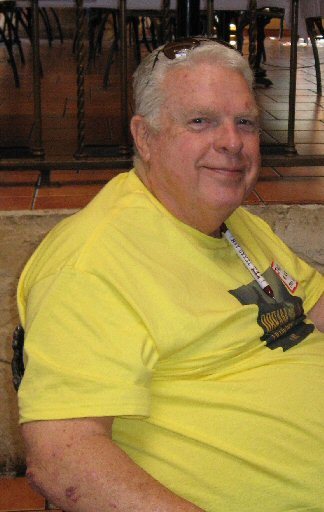 Jack Advertising Lillie’s Novel Dream or Destiny
Jack Advertising Lillie’s Novel Dream or Destiny Jack and Lillie “Just Married”
Jack and Lillie “Just Married”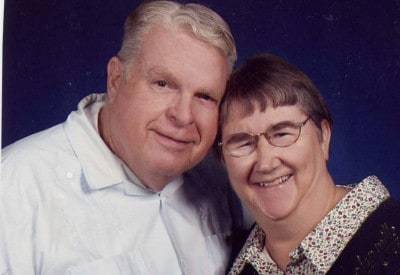 Jack and Lillie in Later Years
Jack and Lillie in Later YearsMy father disliked Jack long before he met him. After all, Jack was thirteen years older than me, divorced, and—worst of all—a city slicker. Daddy was convinced he was out to take advantage of this naive farm girl, and Daddy didn’t want to see me hurt. But when I announced that I was going to marry Jack with or without Daddy’s blessing, even though I really wanted his approval, Daddy relented and agreed to give Jack a chance.
Early in our marriage, Daddy asked Jack to help vaccinate and brand cattle. I think Daddy thought this city slicker would decline, or if he accepted, he would complain and be of little or no help. At lunch, Jack was so excited telling me about what they did. “Your daddy slaps the cow on the rump while someone sticks them with the vaccinating needle, and the cow doesn’t even realize what happened.” He was amazed at that and went on and on about their experiences of the morning. Of course, everyone else at the table knew all about this, but we all loved Jack’s enthusiasm.
That moment may have been when Jack and my daddy bonded, and they loved each other deeply for the rest of Daddy’s life. Jack was as devastated as the rest of the family when Daddy was diagnosed with Alzheimer’s—watching the deterioration of the strong, smart, gentle man was painful for all of us.
Two decades later, Jack apparently recognized the symptoms in himself long before I or anyone else did. He had always expressed his love to me in words and deeds many times a day. He would leave me notes—not pretty cards but scraps of paper he recycled—telling me he loved me. But in his mid-seventies, he would suddenly appear at my office door and say, “No matter what happens, I want you to always remember how much I love you.”
At other times, he would say, “I don’t understand how your father could forget your mother.” Although he had said similar things while my father was alive, I found it strange that he was thinking and talking about that so long after Daddy’s death. Later, I realized that he was afraid he was going to forget me, and he wanted to remind me—and perhaps himself—of his love.
The first signs Daddy exhibited were memory losses and confusion; Jack’s first outward symptoms were personality changes.
Jack always had a quick temper—but it was as quick as to end as it was to start. And his short bursts of temper were unpleasant, but never cruel. That changed, though, in his mid-seventies. He was easily agitated and more aggressive. One time, he called me a vile name and shoved me into the kitchen cabinet. Hours later, after he calmed down, I told him I would not tolerate that. He broke down in tears. “Why are you saying that?” he asked. “You know I would never call you that word. You know I would never push you!”
That’s when I realized that not only was he not in control of his behavior, but he wasn’t even aware of it. He was diagnosed with Alzheimer’s and put on medication. Since Alzheimer’s is such an unpredictable disease, it’s often hard to tell if the medication is helping. In Jack’s case, though, I believe the medication calmed him down. He still got very agitated, especially when facing change or new situations. However, he never again became as aggressive as that day in the kitchen and never again called me ugly names.
His memory continued to deteriorate, though, and he was often confused. He became more and more dependent on me, and for the last couple of years of his life, I was with him and cared for him round the clock. We didn’t get out much, except for our weekly 2 AM trips to Walmart, followed by breakfast at Denny’s.
We always had the same waitress, since she was the only one on duty at that time of night. She noted that she would ask Jack something, and rather than responding, he would look at me. I would repeat what she said, and he would answer. She would say, “You said the exact words I did, and you’re not speaking any louder than I am. How can he understand you and not me?”
After forty-five years of marriage, we understood each other perfectly. Well, perhaps not perfectly. As his condition worsened, he said and did things that didn’t make sense. However, while I couldn’t figure everything out, I got very good at deciphering what he meant or why he did what he did.
I’m so thankful that God let him keep his sense of humor to the end. He couldn’t understand subtle humor and often missed the punchlines of jokes, but he still laughed and found humor every day. And he was happy. We often just sat on the front porch, watching our cat and looking out over the neighborhood. He frequently turned to me and said, “We have a good life, don’t we?”
And I’m thankful that he always knew me. Near the end, I had one brief scare. I was helping him dress. Suddenly he said, “I don’t want you to help me. I want Lillie.” My heart sank. But I turned his face to mine, held his hands, and said, “Look at me.” He gazed into my eyes. I said, “I am Lillie.” He looked at me a few seconds longer, then said, “Okay” and allowed me to finish dressing him.
Six years ago today, Jack, who had been uncommunicative for several hours, slipped away to Heaven with me at his side holding his hand. I still miss him terribly, but I am so thankful for many things. We were married more than forty-five years, and we never lacked for love and laughter. I feel especially blessed that God took him before his Alzheimer’s advanced to the stage where he didn’t know me. That was his greatest fear, and God spared him—and me—from that. And I know he is in Heaven filled with joy right now, and I will be too one day.
A friend will take me to the cemetery today. I know a lot of people like to talk to their loved ones at the cemetery, but I don’t say much there. I still talk to Jack in the home I moved into on the day we married, where we shared so much life and love.

You can read more memories of Jack—his own favorite stories and anecdotes from friends and family, in Jack Stories: Favorites Memories of Jack Jordan Ammann Jr[image error].
September 21, 2018
World Alzheimer’s Day
 Alzheimer’s disease
Alzheimer’s diseaseIf you’ve read my blog for a while, you know raising awareness of Alzheimer’s is a cause close to my heart. I saw my grandfather being hauled off to the state hospital (the only mental institution available) when I was twelve years. At the time, the doctors said he had “hardening of the arteries.”
Three decades later, my father was diagnosed with Alzheimer’s. Seeing the same behaviors in him that my grandfather exhibited, we realized that Grandpa had Alzheimer’s, but it wasn’t well-recognized in those days. Along with my mother, siblings, nephews, and paid caregivers, I helped care for Daddy for several years until he was too debilitated and had to placed in nursing care.
Almost twenty years later, my husband was diagnosed with the dreaded disease. Until the last few days of his life, I was his sole caregiver, and he was totally dependent on me. I am blessed that I was able to turn much of my work over to an associate and focus on my husband.
Alzheimer’s a terrible disease that turns strong and wise men and women into helpless children unable to think for themselves. It destroys the personality and takes away the memories. I know how devastating this disease is, and I’m praying for a cure.
Today is World Alzheimer’s Day. If you haven’t had experience with Alzheimer’s, thank God and pray for those who haven’t been so fortunate.
Image: © Depositphotos.com/nenovbrothers
September 19, 2018
Authors, Please Tell Us …

I love a good mystery, but I don’t want important things about the book I’m about to read to be a mystery. Like every reader, I have specific things I like and things I don’t like. Authors will be disappointed if they think their book is so exceptional that readers will love it even when they find elements they don’t want. More likely, the reader will give up in disgust or even become angry.
For example, I abhor cliffhanger endings. I rarely write negative reviews, though I have posted more than 2000 book reviews on Goodreads. If I’m not enjoying a book, I abandon it and don’t write a review as I don’t believe it’s fair to review something I didn’t finish. However, if I enjoy a book and get to the end to find a cliffhanger ending, I do review the book negatively and vow never to read another book by that author. Had there been a brief warning in the book description, I wouldn’t have downloaded the book to my Kindle and wouldn’t have been disappointed in the ending, and the author would still have a chance I’d become a reader of other books without cliffhanger endings.
I also don’t like to read explicit sex and violence. I will abandon the book if I encounter more than a very brief episode. Since I abandon the book, I don’t write a negative review, but I will warn other people with values like mine.
If the author just lets the reader know what to expect, she will attract the readers who like what she has to offer and avoid the ones who will write negative reviews or warn others about her.
A book described as Christian will attract my attention, whereas I’ve read many reviews that said, “If I had known this was a Christian book, I would not have ordered it.”
Every reader should be able to read or not read what he prefers. I’m not suggesting censorship in any form. I don’t even want to see something like the Motion Picture Association of America’s movie ratings, where a group of people decide what ages films are appropriate for. All I’m suggesting is that authors and publishers write book descriptions that let readers know what to expect.
And the information doesn’t have to be in the form of a warning. A simple statement like “Readers who love cliffhanger endings will want to read this series” or “Lots of emotion and lots of steam” will help draw the right target audience and repel readers who probably won’t love the book.
Seems to be a win-win: authors attract the ideal readers, and other readers don’t encounter things that offend them, whether that’s blood and gore or Christian faith.




